
The history of what is now Wales begins with evidence of a Neanderthal presence from at least 230,000 years ago, while Homo sapiens arrived by about 31,000 BC. However, continuous habitation by modern humans dates from the period after the end of the last ice age around 9000 BC, and Wales has many remains from the Mesolithic, Neolithic, and Bronze Age. During the Iron Age the region, like all of Britain south of the Firth of Forth, the culture had become Celtic, with a common Brittonic language. The Romans, who began their conquest of Britain in AD 43, first campaigned in what is now northeast Wales in 48 against the Deceangli, and gained total control of the region with their defeat of the Ordovices in 79. The Romans departed from Britain in the 5th century, opening the door for the Anglo-Saxon settlement. Thereafter, the culture began to splinter into a number of kingdoms. The Welsh people formed with English encroachment that effectively separated them from the other surviving Brittonic-speaking peoples in the early middle ages.

The current capital of Wales is Cardiff. Historically, Wales did not have a definite capital. In 1955, the Minister for Welsh Affairs informally proclaimed Cardiff to be the capital of Wales. Since 1964, Cardiff has been home to government offices for Wales, and since 1999 it has been the seat of the Senedd.
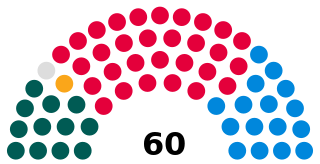
The Senedd, officially known as the Welsh Parliament in English and Senedd Cymru in Welsh, is the devolved, unicameral legislature of Wales. A democratically elected body, it makes laws for Wales, agrees to certain taxes, and scrutinises the Welsh Government. It is a bilingual institution, with both Welsh and English being the official languages of its business. From its creation in May 1999 until May 2020, the Senedd was officially known as the National Assembly for Wales and was often simply called the Welsh Assembly.
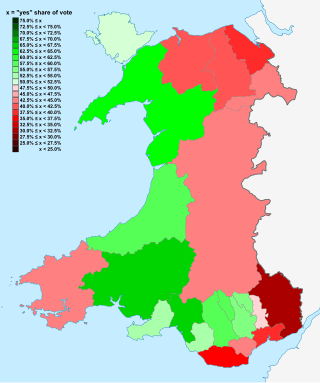
The Welsh devolution referendum of 1997 was a pre-legislative referendum held in Wales on 18 September 1997 over whether there was support for the creation of a National Assembly for Wales, and therefore a degree of self-government. The referendum was a Labour manifesto commitment and was held in their first term after the 1997 election under the provisions of the Referendums Act 1997. This was the second referendum held in Wales over the question of devolution: the first referendum was held in 1979 and was defeated by a large majority.
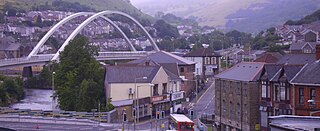
Porth is a town and a community in the county borough of Rhondda Cynon Taf, within the historic county boundaries of Glamorgan, Wales. Lying in the Rhondda Valley, it is regarded as the gateway connecting the Rhondda Fawr and Rhondda Fach valleys due to both valleys meeting at Porth. The Welsh word "porth" means "gate". Porth is a predominantly English-speaking community.

Welsh nationalism emphasises and celebrates the distinctiveness of Welsh culture and Wales as a nation or country. Welsh nationalism may also include calls for further autonomy or self-determination, which includes Welsh devolution, meaning increased powers for the Senedd, or full Welsh independence.

Politics in Wales forms a distinctive polity in the wider politics of the United Kingdom, with Wales as one of the four constituent countries of the United Kingdom (UK).

Carwyn Howell Jones is a Welsh politician who served as First Minister of Wales and Leader of Welsh Labour from 2009 to 2018. He served as Counsel General for Wales from 2007 to 2009. Jones served as the Member of the Senedd (MS) for Bridgend from 1999 to 2021.
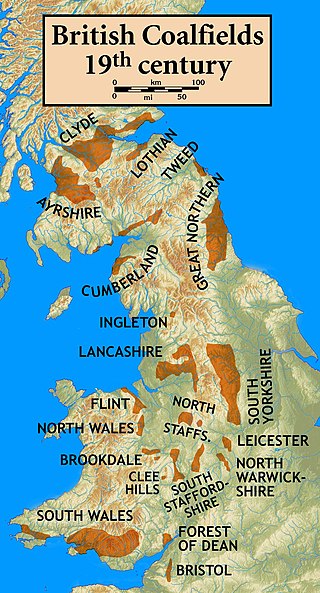
The South Wales Coalfield extends across Pembrokeshire, Carmarthenshire, Swansea, Neath Port Talbot, Bridgend, Rhondda Cynon Taf, Merthyr Tydfil, Caerphilly, Blaenau Gwent and Torfaen. It is rich in coal deposits, especially in the South Wales Valleys.
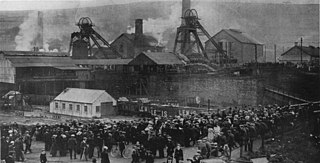
The Senghenydd colliery disaster, also known as the Senghenydd explosion, occurred at the Universal Colliery in Senghenydd, near Caerphilly, Glamorgan, Wales, on 14 October 1913. The explosion, which killed 439 miners and a rescuer, is the worst mining accident in the United Kingdom. Universal Colliery, on the South Wales Coalfield, extracted steam coal, which was much in demand. Some of the region's coal seams contained high quantities of firedamp, a highly explosive gas consisting of methane and hydrogen.
Welsh Labour, formerly known as the Labour Party in Wales, is an autonomous section of the United Kingdom Labour Party in Wales and the largest party in modern Welsh politics. Welsh Labour and its forebears have won a plurality of the Welsh vote at every UK general election since 1922, every Assembly and Senedd election since 1999, and all elections to the European Parliament in the period 1979–2004 and in 2014. Welsh Labour holds 27 of the 32 Welsh seats in the UK Parliament, 30 of the 60 seats in the Welsh Senedd and 576 of the 1,264 councillors in principal local authorities including overall control of 10 of the 22 principal local authorities.
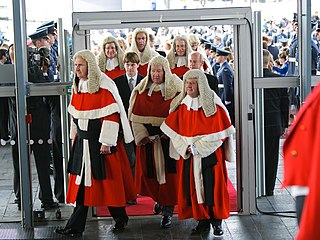
Welsh law is an autonomous part of the English law system composed of legislation made by the Senedd. Wales is part of the legal jurisdiction of England and Wales, one of the three legal jurisdictions of the United Kingdom. However, due to devolution, the law in Wales is increasingly distinct from the law in England, since the Senedd, the devolved parliament of Wales, can legislate on non-reserved matters.

Welsh independence is the political movement advocating for Wales to become a sovereign state, independent from the United Kingdom.

Mining in Wales provided a significant source of income to the economy of Wales throughout the nineteenth century and early to mid twentieth century. It was key to the Industrial Revolution in Wales, and to the whole of Great Britain.

A referendum on the powers of the National Assembly for Wales was held on 3 March 2011. Voters were asked whether the Assembly should have full law-making powers in the twenty subject areas where it has jurisdiction. The referendum asked the question: ‘Do you want the Assembly now to be able to make laws on all matters in the 20 subject areas it has powers for?’

The modern history of Wales starts in 1800 and continues until the present day. In the 19th century, South Wales became heavily industrialised with ironworks; this, along with the spread of coal mining to the Cynon and Rhondda valleys from the 1840s, led to an increase in population. The social effects of industrialisation resulted in armed uprisings against the mainly English owners. Socialism developed in South Wales in the latter part of the century, accompanied by the increasing politicisation of religious Nonconformism. The first Labour Party MP, Keir Hardie, was elected as a junior member for the Welsh constituency of Merthyr Tydfil and Aberdare in 1900.
This article is about the particular significance of the year 2011 to Wales and its people.
The Gleision Colliery mining accident was a mining accident which occurred on 15 September 2011 at the Gleision Colliery, a drift mine at Cilybebyll in Neath Port Talbot, in Wales. The accident occurred while seven miners were working with explosives on a narrow coal seam. Following a blasting operation into a separate disused flooded mine network to increase air-circulation, the tunnel in which the miners were working began to fill with water. Three of the miners escaped, with one being taken to hospital with life-threatening injuries, while the others were trapped underground. A search and rescue operation was launched to locate the four remaining miners, but they were found deceased the following day. The incident is the worst mining disaster to occur in Wales for three decades.
John Davies is a Welsh poet whose first collection, The Strangers, was published in 1974. He was awarded the Alice Hunt Bartlett Prize in 1985.

Welsh devolution is the transfer of legislative power for self-governance to Wales by the Government of the United Kingdom.